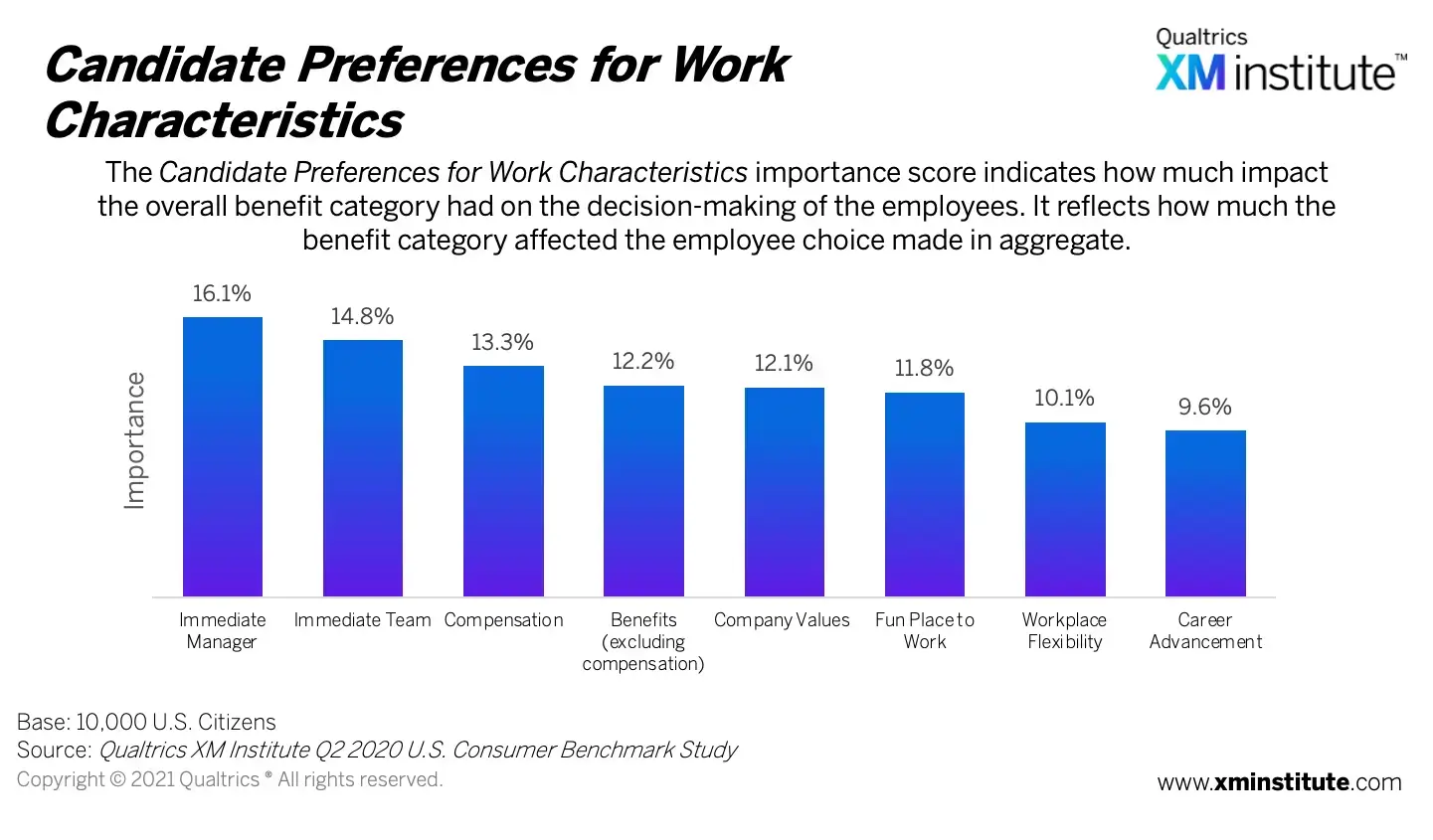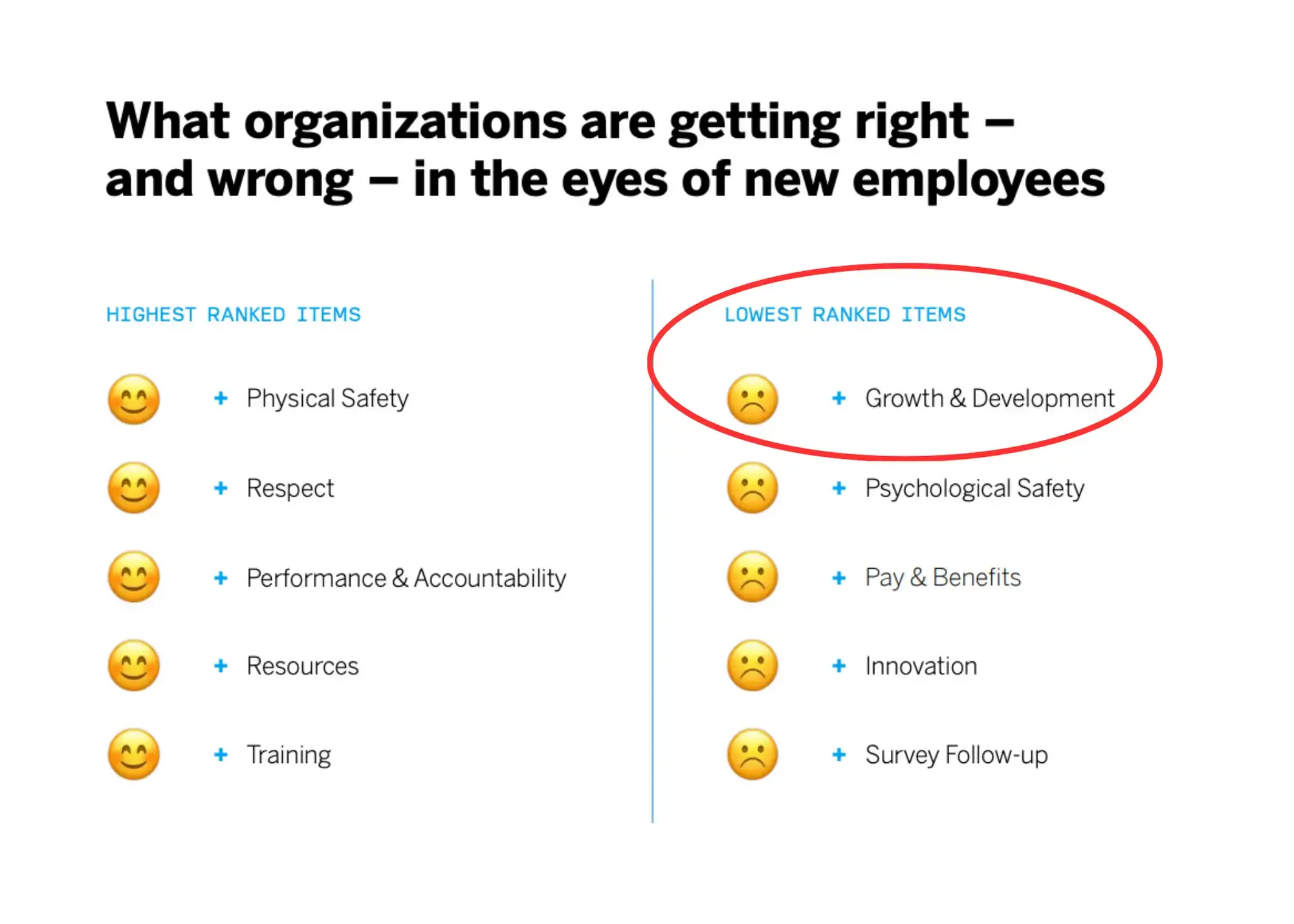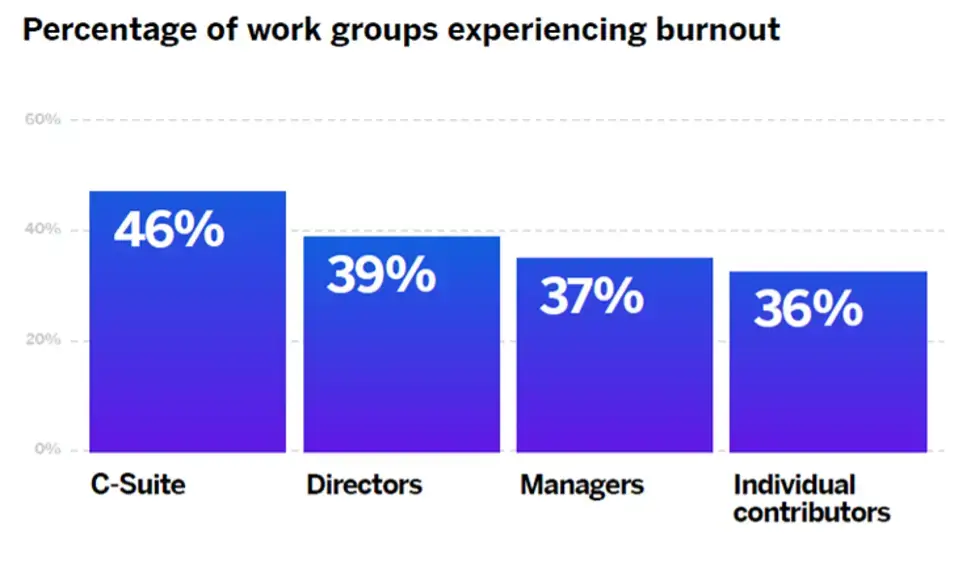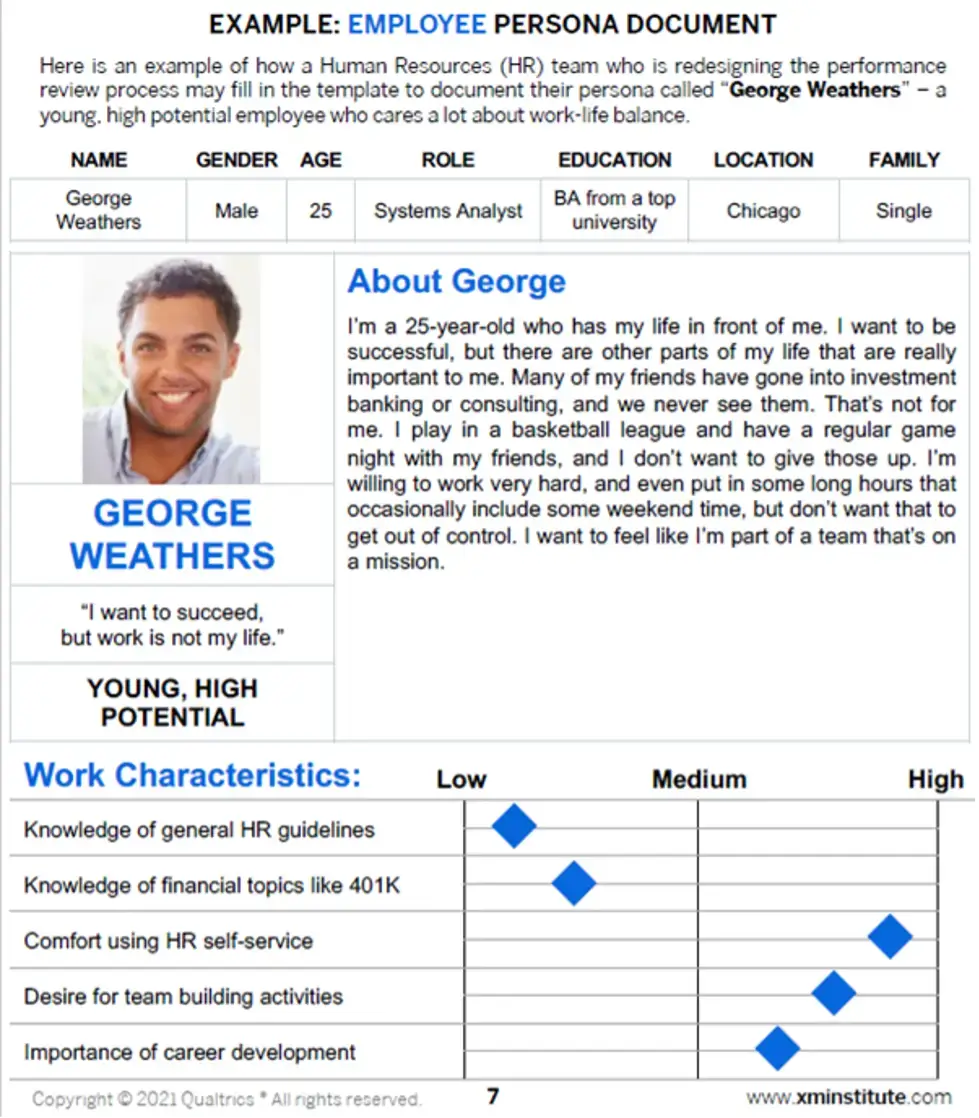
A team’s performance depends on the quality of their manager. Being a better manager is not only about having the right skills and knowledge, it’s also about the right mindset and attitude. Here’s how to improve your management style, communicate effectively with your team, and motivate and empower your employees.
Being a manager is hard. And expectations are high because managers are those critical linchpins of team engagement and business outcomes. One Qualtrics study found that 43% of managers feel more pressure to produce results than they did a year ago, while another one found that 37% of managers reported burnout symptoms.
And the old adage ‘people don’t quit jobs, they quit managers’ still unfortunately rings true: 75% of exiting employees said they were leaving because of a bad manager, not because the job was bad. And when you think that an employee’s direct manager explains 70% of employee engagement, poor managers are leaving a massive experience gap in many organizations.
If you want to retain your best people, and keep them fully engaged, it all starts with managers.
Research shows that what employees really want is good managers. Even as candidates, future employees say that a good manager with whom they’ll have a great relationship is the most influential factor in choosing a job.
76% of people would prefer a job with the best manager and the worst workplace flexibility over a job with the best workplace flexibility and the worst manager (all other factors remaining equal). Managers play a critical role in creating positive employee experiences.

But are ‘bad’ managers really bad? Many feel they got their first job in management before they were probably ready. Few were trained properly, and all too often they were left to figure out management skills all on their own. They need help to become better managers.
The market-leading solution to transform employee engagement
A few key characteristics of great managers
Great managers lead using a combination of ‘hard skills’ and ‘soft skills’. Hard skills are those technical industry skills that get the job done, learned through education, training, apprenticeships and work experiences, such as:
- Sales and marketing
- Accounting
- Business development
- Financial analysis
- Data analysis
- Project management
And now, with the advancement of AI disrupting the world of work, with machines now being able to do some of the jobs that were previously part of a manager’s remit, some hard skills will diminish in importance over time.
What will become more important – and will characterize great managers - will be human to human ‘soft skills’, such as:
Communication skills
Communication that is respectful, open and transparent. Managers will be honest, direct and straightforward, and team members will feel they can be the same with them. Managers will address mistakes in a constructive way, treating errors as learning opportunities, and making regular feedback part of the job.
Influence
By behaving in a professional manner, appreciating employees and meeting them on an equal footing, and providing stability and direction at uncertain times, managers will be able to positively influence their teams to engage with their work.
Vulnerability and bravery
Vulnerable and brave managers are able to express and expose, in words and behavior, who they really are and what they genuinely think and feel. Embracing vulnerability indicates emotional intelligence: being yourself, authentic, honest, trustworthy, and relatable – all great leadership skills for a manager.
Vulnerable leaders tend to:
- model that team members can be honest and open themselves
- increase their own self-awareness and understanding of the workforce
- drive better decision making
Openness about mental health
Every year, one in five American adults experiences a mental health condition. Data shows that:
- 48% of employees say their wellbeing declined in 2022
- 28% say they are miserable at work
- Stress is at an all-time high
- 60% of employees are emotionally detached at work
- 77% of employees say they would consider leaving a company that doesn’t focus on wellbeing
Managers need to be equipped to discuss a mental health problem when a team member mentions it, or needs somebody to talk to. They must be empowered to be able to reach out, listen, and support the employee and maybe signpost some resources for practical help.
10 steps to become a better manager
1. Take a long hard look at yourself
Before managers can encourage their teams to work together, they need to think about their own behaviors and foibles, and how they might be affecting the team. Be brave - ask for honest feedback about yourself from your team members, peers and leaders. A good manager demonstrates empathy - reflecting on their own experiences - before labeling an employee as troublesome, complaining, or too slow at their tasks.
2. Flex your management style
Prepare to be flexible: some teams may need a prescriptive, structured, authoritative approach, others can be left to get on with the job with minimal intervention. Take particular care with your hybrid and remote workers – they will need more communication and structure than in-office employees.
3. Set out clear expectations and goals
We can all relate to that satisfying feeling of knowing what we are doing, with what resources, with whom, and when to deliver. Teams who are clear on what they’re expected to do are more engaged and motivated.
4. Really know your team members
This is where vulnerability comes in. To build trust and discover what truly engages people, you need to bring your authentic, real self to work and risk being vulnerable by sharing your story, your passions and your lived experience, so they will do the same. Join your team for lunch, go to social events, work beside them, ask questions about their lives and work, and listen to the answers.
5. Create a trusting and psychologically safe environment
When team members can freely voice their thoughts, opinions and ideas, or challenge the status quo in front of their peers, colleagues, and leaders without fear of ridicule, repercussions or embarrassment - this is psychological safety. A good manager encourages team members to respect and trust each other in a safe, collaborative work environment.
6. Model best practice
Are you on time in the mornings? Do you always hit set deadlines? Are you responsive to messages? Do you leave your laptop in the office over weekends? Do you delegate tasks? Employees tend to copy what their managers do, so if you want your team to behave and work to high standards, you have to stick to them too.
7. Check in regularly
Even an experienced team doesn’t thrive without interest from management. Regular huddles, or one-to-ones, to check progress, assess responsibilities and answer queries keep teams enthusiastic.
8. Make feedback as easy as conversation
Feedback, whether it’s informal or formal, helps to connect employees, align teams, and accomplish goals. Exceptional feedback celebrates employee strengths and identifies opportunities to learn and grow. By developing a culture of feedback and empowering employees to deliver and receive feedback, managers create great employee experiences for their team.
9. Grow and develop your team effectively – including yourself
Employees – especially new ones – crave growth and development. Unfortunately, our most recent research found this to be among the lowest ranked items:

To address this experience gap, a good manager must be more intentional about providing their teams with clear pathways for professional growth and development – including themselves (by asking for management training).
10. Look after your own wellbeing
Managers are ‘piggy in the middle’ between the demands of senior leadership above and that of their teams and direct reports below. No surprise that 37% of them reported burnout last year:

Managers won’t be good if they’re exhausted and disengaged. It’s essential that they are given the resources and support so they can achieve work-life balance to rise to leadership challenges, and also model that self-care behavior.
Managing different types of people
We all know that the best work environment is one that is diverse and inclusive: a mixture of ages, cultures, parental/caring responsibilities, experiences, personalities… How can a manager deal individually with all these?
While an effective manager will get to know their team members, often the organization as a whole will not, and will instead implement a ‘one size fits all’ solution, whereby employees are issued with the same perks, working environment and professional development. A classic example of this is offering free parking as part of the compensation package to every employee – regardless of whether they can drive or not.
This is where talent segmentation comes in. By segmenting your employees into ‘personas’, based on their roles, expectations and needs, you can adapt your management style to best serve each segment.

Different segments respond differently to communication methods, motivation, rewards, coaching and collaboration.
For example, high achievers may receive more recognition, reward, and promotion opportunities. Lower achievers may be targeted with more training, support and resources. By segmenting your employees by persona, you can identify gaps, opportunities, or risks within your teams and make improvements accordingly. In short, manage them well.
How Qualtrics® can help you be a better manager
We know how challenging a manager’s responsibilities can be, and listening to employees and acting on their feedback needs to be at the heart of being an effective leader. For a complete picture, add experience (X) data to your operational (O) and behavioral data when making daily decisions.
We feel strongly that adding X-data to your action planning should be simple, and part of a manager’s job. This is why we’ve developed Manager Assist – a powerful system, built specifically for managers and their teams to help them know exactly where to focus and how to drive improvement.
Manager Assist brings together – in a single place – everything a manager needs to increase employee engagement and productivity and reduce costly and unwanted attrition. It analyzes the feedback employees offer through engagement surveys, and, with continuous listening, what employees are saying on public channels.
With Manager Assist:
1. It’s simple to gather all the data about how your employees feel
Everything from employees’ feedback and engagement or pulse surveys, to the comments they leave on public channels on tools like Slack, Glassdoor, X, Facebook or any other place where they openly talk about their experience.
2. It shows managers exactly where to focus - no more guesswork
Manager Assist uses powerful cutting edge AI to comb through the data and pick out the most important things; those that will actually improve engagement and retention.
3. Managers don’t need to go it alone any more
Manager Assist automatically pulls the team in to be part of the solution. It has built-in action and collaboration tools so that managers are just a click away from huddling with their teams to collaborate, brainstorm ideas, and create a plan with shared accountability based on the whole team’s feedback.
4. Share results and progress with teams so everyone knows exactly what’s happening
With Manager Assist, it’s now standard protocol to share results and progress to team members. Everyone is in the loop, knowing where managers are focused, and how they each help to create a better workplace experience. You can make progress in weeks, not quarters.
The market-leading solution to transform employee engagement